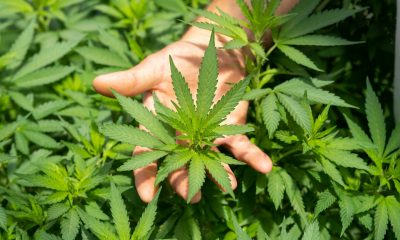Cannabis
Germany Has Legalized the Possession and Cultivation of Cannabis
The legalization of cannabis in Germany opens new perspectives for responsible consumption, market regulation and protection of society, especially its younger members. By introducing clear rules and regulations, Germany is committed to a conscious and safe approach to cannabis use, with the hope of reducing drug-related crime and improving the quality of life of its citizens.

The German parliament decided to legalize the possession and cultivation of cannabis for personal use, opening a new chapter in the country’s history. The Bundestag decided to legalize the possession of 25g of cannabis for personal use, the cultivation of three cannabis plants at home and the launch of social cannabis clubs.
407 MPs voted for the adoption of the act , 226 voted against the introduction of the act. Out of 637 votes cast, 4 people abstained.
If you want to find the details of the new law, which comes into force on April 1st, and to find the most important cannabis news of the day, download for free the Hemp.im mobile app.
Legalization in Germany: What you need to know
The legalization of cannabis in Germany is not a new topic, but the new law approved by the Bundestag introduces new rules that are aimed not only at removing taboos related to consumption, but also at fighting the black market and the accompanying crime. Here are the key points of the new law:
- Availability and cannabis clubs
Adults in Germany will gain legal access to cannabis, able to purchase up to 25 grams a day through non-commercial cannabis clubs. Production will be available in licensed non-profit clubs from July 1. These clubs, with a maximum number of 500 members, will become places where adult residents will be able to purchase cannabis, with a limit of 50 grams per month per member. - Growing cannabis for personal use
The new regulations allow individuals to grow up to three plants per household. You will be allowed to have up to 50g of home-grown cannabis at home. - Youth protection and restrictions
To protect young people, the new law maintains the prohibition on the possession and consumption of cannabis by minors. Additionally, regulations have been introduced for young adults aged 18 to 21, who will be able to purchase cannabis in cannabis clubs with a THC content limit of 10%. To further protect children, the consumption of cannabis will be prohibited at a distance of at least 100 meters from schools and educational institutions. - Cannabis possession and regulations
Under the new rules, German residents will be able to legally possess up to 25 grams of cannabis in public spaces. Possession of an amount of 25 to 30 grams will be classified as an administrative offense, and it will be possible to possess up to 50 grams at home. Such regulations aim to enable the use of cannabis while maintaining public order and safety. - Product safety and increased penalties
The key element of the new policy is to ensure product safety by eliminating toxic additives in the products sold. The push for safe consumption is supported by tougher penalties for those selling cannabis to minors, with minimum prison sentences of two years.
Prospects and optimism
The legalization of cannabis in Germany is causing optimism not only among supporters of personal freedom, but also among public safety and health experts. Here are some optimistic prospects from the new law:
Reducing crime: Access to legal cannabis will reduce demand on the black market, which in turn could lead to a decline in drug-related crime.
Consumer safety: Regulation will ensure consumers have access to safe and controlled products, eliminating the risks associated with unsafe additives. Hemp clubs and your own cultivation provide greater confidence in the quality of products.
Public Enthusiasm: Legalization could help shift public perceptions of cannabis, from stigmatization to acceptance as a substance of limited risk for adults.
Consumer Protection: Through government regulations, consumers will be protected against unfair practices and unsafe products from the black market.
Experts opinions on the legalization of cannabis in Germany
Before the vote, Federal Health Minister Karl Lauterbach (SPD) defended his plan to legalize the possession and cultivation of cannabis and called for the bill’s approval.
“ We have a thriving black market, we have accompanying crime, we have dangerous additives to products, toxic concentrations and we have a lot of drug crime ,” Lauterbach said on Friday in an interview with NDR Info. “With legalization, we are taking cannabis out of the taboo zone.”
“The legalization of cannabis was adopted in the Bundestag by a majority of 407 to 226. A good day for our failed drug policy,” wrote Health Minister Karl Lauterbach on the X website.
Federal Minister of the Interior Nancy Faeser (SPD) also sees benefits above all in the plans. “I take these concerns seriously. That is why we have included a number of safeguards in the draft bill of the Ministry of Health that strengthen the safety and protection of minors,” Faeser told Bayern’s media group on Friday. “We can no longer accept the current situation.” Prosecuting cannabis crimes currently involves too many forces that are lacking elsewhere.
“With cannabis clubs and cultivation for personal use, the demand on the black market will drop dramatically,” Federal Government Commissioner for Drugs Burkhard Blienert (SPD) told the Editorial Network Germany (RND). “I am convinced that anyone who will be able to grow hemp on their own will no longer buy dangerous mixtures from black market dealers,” he added. “Bans do not help fight pot smoking, and the current criminalization of people has nothing to do with health care.”
Conclusions
Once approved by the Bundestag, the bill must now be submitted to the Bundesrat on March 22nd, but does not require approval. In principle, the State Chamber could establish a joint mediation commission with the Bundestag and thus slow down the plans. Lauterbach said: “If problems arise in the Federal Council, we will also be able to solve them.”
The legalization in Germany opens new perspectives for responsible consumption, market regulation and protection of society, especially its younger members. By introducing clear rules and regulations, Germany is committed to a conscious and safe approach to cannabis use, with the hope of reducing drug-related crime and improving the quality of life of its citizens.
__
(Featured image by Shelby Ireland via Unsplash)
DISCLAIMER: This article was written by a third party contributor and does not reflect the opinion of Born2Invest, its management, staff or its associates. Please review our disclaimer for more information.
This article may include forward-looking statements. These forward-looking statements generally are identified by the words “believe,” “project,” “estimate,” “become,” “plan,” “will,” and similar expressions. These forward-looking statements involve known and unknown risks as well as uncertainties, including those discussed in the following cautionary statements and elsewhere in this article and on this site. Although the Company may believe that its expectations are based on reasonable assumptions, the actual results that the Company may achieve may differ materially from any forward-looking statements, which reflect the opinions of the management of the Company only as of the date hereof. Additionally, please make sure to read these important disclosures.
First published in FaktyKonopne. A third-party contributor translated and adapted the article from the original. In case of discrepancy, the original will prevail.
Although we made reasonable efforts to provide accurate translations, some parts may be incorrect. Born2Invest assumes no responsibility for errors, omissions or ambiguities in the translations provided on this website. Any person or entity relying on translated content does so at their own risk. Born2Invest is not responsible for losses caused by such reliance on the accuracy or reliability of translated information. If you wish to report an error or inaccuracy in the translation, we encourage you to contact us

-

 Fintech1 week ago
Fintech1 week agoImpacta VC Backs Quipu to Expand AI-Driven Credit Access in Latin America
-

 Impact Investing6 days ago
Impact Investing6 days agoClimate Losses Drive New Risk Training in Agriculture Led by Cineas and Asnacodi Italia
-

 Biotech2 weeks ago
Biotech2 weeks agoWhy Bioceres Shares Slide Into Penny Stock Territory
-

 Crowdfunding2 days ago
Crowdfunding2 days agoReal Estate Crowdfunding in Mexico: High Returns, Heavy Regulation, and Tax Inequality

























